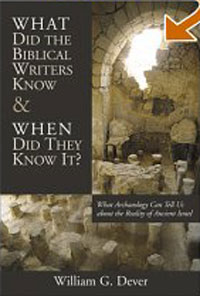Dever, professor of Near Eastern archaeology and anthropology at the University of Arizona, has excavated in the Near East for the past 35 years. In this book, he gives readers a cross-section of the world of Syro-Palestinian archaeology. As in an archaeological dig, there are some items here that nonexperts will find fascinating, but much of little interest. The book"s title and subtitle are misleading: while the text does contain a helpful survey of the ways in which archaeology can (and cannot) illuminate the historicity of the Bible, this amounts to less than half of the total content. Most of the book is a lengthy argument with a group of scholars Dever calls "the Revisionists," who dismiss the idea that archaeological investigation of the Near East can provide any objectively useful data for reconstructing a history of the region. Dever is understandably opposed to such a view. This book therefore contains two different works: one is a helpful introduction to the world of Syro-Palestinian archaeology and its possible interaction with biblical studies, while the other is a diatribe against a certain cadre of scholars and the philosophical background they represent. It will be rare to find a nonspecialist reader who has interest in the former but is also willing to dig through the latter. Это и многое другое вы найдете в книге What Did the Biblical Writers Know and When Did They Know It?: What Archaeology Can Tell Us About the Reality of Ancient Israel (William G. Dever)
What Did the Biblical Writers Know and When Did They Know It?: What Archaeology Can Tell Us About the Reality of Ancient Israel William G. Dever
Подробная информация о книге «What Did the Biblical Writers Know and When Did They Know It?: What Archaeology Can Tell Us About the Reality of Ancient Israel William G. Dever». Сайт не предоставляет возможности читать онлайн или скачать бесплатно книгу «What Did the Biblical Writers Know and When Did They Know It?: What Archaeology Can Tell Us About the Reality of Ancient Israel William G. Dever»
